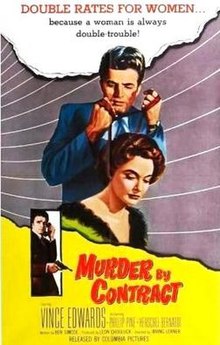Murder by Contract
| Murder by Contract | |
|---|---|
 |
|
| Directed by | Irving Lerner |
| Produced by | Leon Chooluck |
| Written by | Ben Simcoe |
| Starring |
Vince Edwards Phillip Pine Herschel Bernardi |
| Music by | music composed and played by Perry Botkin |
| Cinematography | Lucien Ballard a.s.c. |
| Edited by | Carlo Lodato |
|
Production
company |
Orbit Productions
|
| Distributed by | Columbia Pictures |
|
Release date
|
|
|
Running time
|
81 minutes |
| Country | United States |
| Language | English |
Murder by Contract is a 1958 film noir crime film directed by Irving Lerner. Academy Award-nominated screenwriter Ben Maddow did uncredited work on the film. Centering on an existentialist hit man assigned to kill a woman, the film is often praised for its spare style and peculiar sense of cool.
Though not widely seen at the time of its release, it finally appeared on DVD, included in the boxed set, "Columbia Pictures Film Noir Classics, Vol. 1 (The Big Heat / 5 Against the House / The Lineup / Murder by Contract / The Sniper)," released November 3, 2009. The film has exerted an influence on American cinema, most notably on director Martin Scorsese, who famously cited Murder by Contract as "the film that has influenced [him] most."
Vince Edwards plays Claude, a disaffected man who, in search of money, decides to become a contract killer. After successfully killing targets in a barber shop and a hospital, as well as his own boss, Claude is given a contract to kill the witness in a high-profile trial in Los Angeles. At first calm about the assignment, Claude becomes more nervous when he discovers the witness in question is a woman (Caprice Toriel). Claude scrambles to find a way to kill the witness, who never leaves her closely guarded house. After several complicated attempts (which involve high voltage and flaming arrows), Claude is convinced he has killed the witness, but discovers that the police have faked her death. Convinced he will be unable to fulfill the contract, Claude quits, only to find the two men who have been assisting him have now been instructed to kill him. After killing the men, Claude finally succeeds in sneaking into the witness's house, but hesitates when he's about to strangle her. The relief police arrive; Claude attempts to escape but is killed during a shoot-out.
The film's main character, Claude, is set apart from the other hit men in the film by his unwillingness to carry a gun (most of his victims are dispatched in unusual ways) and his casual approach to murder, which he treats as a business. He spends the first several days of his visit to Los Angeles sight-seeing instead of planning the assassination. Claude's casualness comes from the fact that he views men as largely predictable, and for that reason is unwilling to kill a woman (women, in his opinion, are more complicated).
...
Wikipedia
